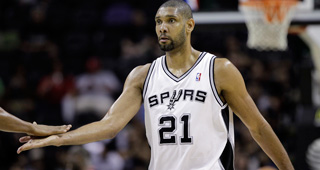Through an unwinding one month of recovery after the NBA Finals, Tim Duncan’s mind wandered back every so often to those closing moments of Game 6 and that half-hook, half-floating shot he missed near the rim to tie Game 7. The sequence left the poised Duncan sinking into his jersey and pounding the court with his right hand: Down two points, he backed down Shane Battier, backed the Miami Heat into potential overtime, only to leave the layup short.
Moments after the Finals defeat, Duncan walked off the podium saying Game 7 will forever haunt him. Before resuming his training in the offseason, he had pondered whether his San Antonio Spurs would ever again play for the championship that slipped away.
And here’s Duncan this season, as well conditioned as a year ago and still breaking records and chasing history at 37 years old. Seventeen NBA seasons in now, Duncan makes clear nothing has changed in his summer workouts – rather, an elevated program this past offseason challenged him further and placed him into basketball shape earlier.
“It’s actually increased a little more,” Duncan told RealGM of his offseason workout regimen, “and I’m able to make sure that I get in shape early on and stay in shape.”
Everyone marvels over his sustainability, the level of production past his prime, and it all starts with sharpening the body summer after summer. Scouts have noticed his lack of lift sometimes, leading to easy lay-ins missed, but Duncan believes he’s still leveling his conditioning early this season and finding the touch on his mid-range jump shot.
Tony Parker has long taken reign as the Spurs’ most explosive offensive player, as their foremost creator, and shooters around him and Duncan have made them far more dangerous with the three-point shot. There’s purity to how these Spurs dismantle teams and disrupt game plans, how surgical they are with execution and patience and passing.
All these seasons later, Duncan’s ability to go for 23 points and 21 rebounds a game after a 20-8 performance – his capacity for 21 points and 16 rebounds in just 24 minutes on Wednesday night – is a testament to his skill and durability, intuition and wisdom. As Duncan says of his game-to-game obstacles, “Every game is an adjustment.”
For the Spurs, everything starts with the partnership between Duncan and Gregg Popovich, the NBA’s longest-standing player-coach relationship that transforms locker rooms and permeates this culture of sustained success.
“[Duncan] is out there with one leg, and he keeps on playing beautiful basketball,” Popovich said. “Makes everybody around him better with the decisions he makes, with the way he plays so unselfishly. He’s still the base of everything that we do.”
From 12 mainstays to three additions (Marco Belinelli, Jeff Ayres, Malcolm Thomas) who also ended their seasons in playoff losses to the Heat, there’s a striking edge within players up and down the Spurs’ roster. San Antonio management captured Belinelli as a free agent when the Chicago Bulls decided to sign Mike Dunleavy Jr. instead, and internally Danny Green has established himself as one of the league’s best knockdown shooters and developing talents like Aron Baynes continue improving.
That squandered layup late in Game 7 never left Duncan in the offseason, and it probably never will. Bring up those Finals to everyone else, and a perpetuate look of regret fills the face. “We were really close. Really close. Really close,” Boris Diaw said. “It was tough.”
One more run to the championship round had made the summer short for Tim Duncan, and no, there wasn’t a let up in his training after 16 seasons. One of the game’s all-time great players worked himself a little more, a little harder. From 1997 to now, nothing has changed, as Popovich states exactly right: Tim Duncan is still the base of everything for the Spurs.



